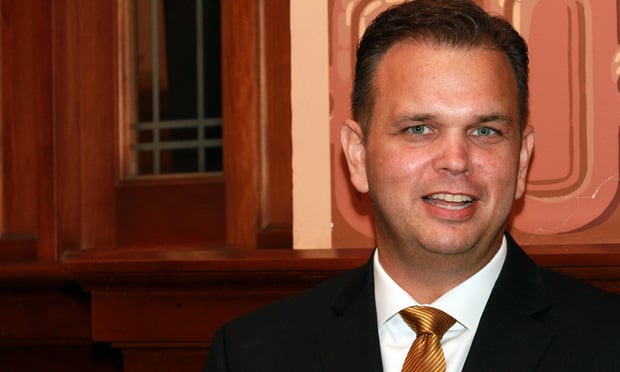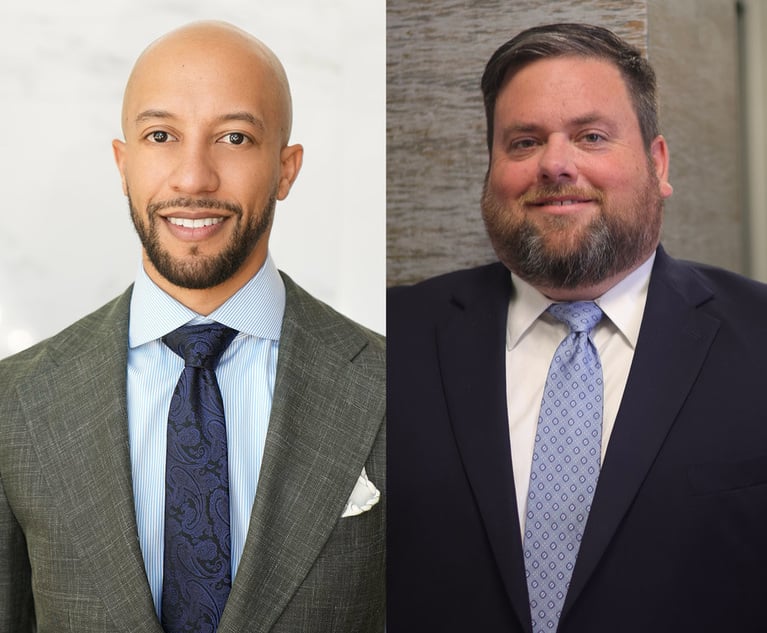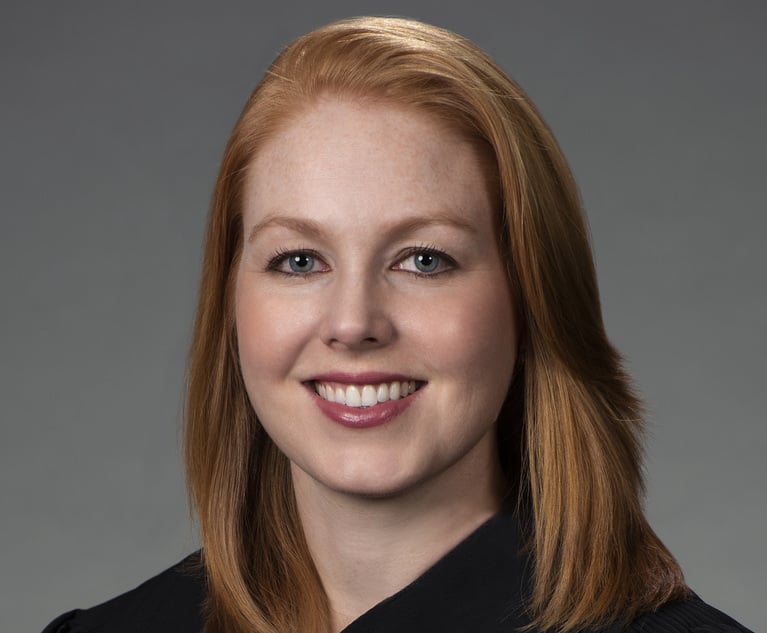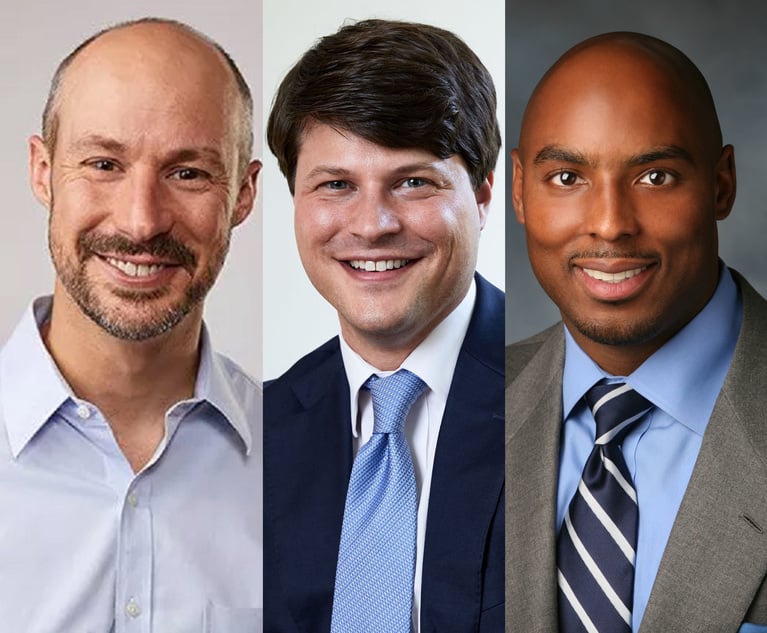Lawyer: Appeals Court Ruling Ends Construction Warranties at Eight Years
The winning parties' attorneys dismiss these fears, while two construction litigators not involved in the case suggested specific contracts can get around any warranty problem in the decision.
November 22, 2019 at 04:08 PM
4 minute read
 Judge Christian Coomer, Georgia Court of Appeals. (Photo: John Disney/ALM)
Judge Christian Coomer, Georgia Court of Appeals. (Photo: John Disney/ALM)
A case over a sulphuric acid leak has burned a hole into Georgia law around a wide range of warranties for property owners, a lawyer for the losing side of a recent state Court of Appeals decision claims.
The winning parties' attorneys dismiss these fears, while two construction litigators not involved in the case suggested specific contracts can get around any warranty problem in the decision.
The Oct. 31 opinion favored Tampa Tank Inc. and Corrosion Control Inc., which argued that they could not be held liable for a 2011 leak in a 2 million gallon tank owned by Southern States Chemical Inc. Tampa had renovated the unit in 2002, and Corrosion Control designed an anti-corrosion system for the tank.
The ruling written by Judge Christian Coomer, joined by Judges Todd Markle and Ken Hodges, "is a serious threat to all property owners in Georgia, because it obliterates the distinction between contract and tort vis-à-vis the statute of repose," said Jeffrey Lewis, a partner at Arnall Golden Gregory. He represents Southern States Chemical.
 Jeff Lewis, Arnall Golden & Gregory. (Photo: John Disney/ALM)
Jeff Lewis, Arnall Golden & Gregory. (Photo: John Disney/ALM)The statute of repose law, OCGA § 9-3-51, prohibits suits for damages for "any deficiency" in the construction process "of an improvement to real property" more than eight years after the construction.
Lewis, whose client was backed with an amicus brief by the Building Owners and Managers Association of Georgia, focused on Coomer's writing that "the unambiguous language" of the law "makes no distinction among claims sounding in negligence and those sounding in contract."
"Whether in tort or in contract, the statute broadly precludes any action to recover damages brought outside the eight year period of repose," Coomer wrote.
Lewis told the Daily Report, under Coomer's ruling, "all warranty rights of all property owners in Georgia (private or public), on a courthouse, Decatur bungalow, small business building, tunnel, office building, stadium, warehouse, factory, barn, or highway bridge, cannot exceed eight years."
Lewis said his client will ask the Supreme Court of Georgia to hear the case, which would extend a matter that has bounced among Fulton County Superior Court, the appeals court and the high court since 2012.
Swift, Currie, McGhee & Hiers partner Brad Wolff, who along with Cecily McLeod of Gordon Rees Scully Mansukhani represents the defendants, dismissed Lewis' arguments. "The Court of Appeals' decision in this case does not affect construction warranties longer than eight years."
He noted that Southern held only a 12-month warranty on the work done by Tampa Tank, so the decision "does not address the effect the statute of repose might have on a different warranty in a different case."
Southern had argued that the tank was covered by a warranty extended by Corrosion Control to Tampa Tank that was to last at least 43 years. Southern's claim was based on a report Corrosion Control provided to Tampa Tank saying the tank system should last 43 to 45 years.
The appeals court rejected that argument, saying "Southern cites no Georgia case law to support its position that payments made by a contractor to a subcontractor for services can be co-opted by a third-party beneficiary as consideration."
Ned Blumenthal, a litigation partner at Weissman who has represented builders and developers, said Georgia law is clear that the same facts can give rise to tort claims or breach of contract claims.
"Just to be safe," Blumenthal said in light of the decision, he'd want a separate contract to deal with warranties on construction.
Gina Vitiello, a shareholder at Chamberlain, Hrdlicka, White, Williams & Aughtry who also represents clients in construction litigation, said she wasn't surprised by the ruling, despite Southern's "very creative lawyering."
She said the court appeared to base its ruling on Southern not being able to rely on its claim of a 43- to 45-year warranty, so the decision is factually different from one dealing with the eight-year limit.
She also said parties wanting to get around the eight-year statute of repose could "contractually agree to a different period of time."
This content has been archived. It is available through our partners, LexisNexis® and Bloomberg Law.
To view this content, please continue to their sites.
Not a Lexis Subscriber?
Subscribe Now
Not a Bloomberg Law Subscriber?
Subscribe Now
NOT FOR REPRINT
© 2025 ALM Global, LLC, All Rights Reserved. Request academic re-use from www.copyright.com. All other uses, submit a request to [email protected]. For more information visit Asset & Logo Licensing.
You Might Like
View All
Trial Court Had No Authority to Reopen Voir Dire After Jury Impaneled in Civil Case, State Appellate Court Rules

'Pushed Into Oncoming Traffic': $5.85M Settlement in Mediated Auto Tort
6 minute read
Justice Known for Asking 'Tough Questions' Resolves to Improve Civility
4 minute read
Law Firms Mentioned
Trending Stories
- 1SDNY Criminal Division Deputy Chief Returns to Debevoise
- 2Brownstein Adds Former Interior Secretary, Offering 'Strategic Counsel' During New Trump Term
- 3Tragedy on I-95: Florida Lawsuit Against Horizon Freight System Could Set New Precedent in Crash Cases
- 4Weil, Loading Up on More Regulatory Talent, Adds SEC Asset Management Co-Chief
- 5Big Banks Did Great Last Year. What Does That Mean for Big Law?
Who Got The Work
J. Brugh Lower of Gibbons has entered an appearance for industrial equipment supplier Devco Corporation in a pending trademark infringement lawsuit. The suit, accusing the defendant of selling knock-off Graco products, was filed Dec. 18 in New Jersey District Court by Rivkin Radler on behalf of Graco Inc. and Graco Minnesota. The case, assigned to U.S. District Judge Zahid N. Quraishi, is 3:24-cv-11294, Graco Inc. et al v. Devco Corporation.
Who Got The Work
Rebecca Maller-Stein and Kent A. Yalowitz of Arnold & Porter Kaye Scholer have entered their appearances for Hanaco Venture Capital and its executives, Lior Prosor and David Frankel, in a pending securities lawsuit. The action, filed on Dec. 24 in New York Southern District Court by Zell, Aron & Co. on behalf of Goldeneye Advisors, accuses the defendants of negligently and fraudulently managing the plaintiff's $1 million investment. The case, assigned to U.S. District Judge Vernon S. Broderick, is 1:24-cv-09918, Goldeneye Advisors, LLC v. Hanaco Venture Capital, Ltd. et al.
Who Got The Work
Attorneys from A&O Shearman has stepped in as defense counsel for Toronto-Dominion Bank and other defendants in a pending securities class action. The suit, filed Dec. 11 in New York Southern District Court by Bleichmar Fonti & Auld, accuses the defendants of concealing the bank's 'pervasive' deficiencies in regards to its compliance with the Bank Secrecy Act and the quality of its anti-money laundering controls. The case, assigned to U.S. District Judge Arun Subramanian, is 1:24-cv-09445, Gonzalez v. The Toronto-Dominion Bank et al.
Who Got The Work
Crown Castle International, a Pennsylvania company providing shared communications infrastructure, has turned to Luke D. Wolf of Gordon Rees Scully Mansukhani to fend off a pending breach-of-contract lawsuit. The court action, filed Nov. 25 in Michigan Eastern District Court by Hooper Hathaway PC on behalf of The Town Residences LLC, accuses Crown Castle of failing to transfer approximately $30,000 in utility payments from T-Mobile in breach of a roof-top lease and assignment agreement. The case, assigned to U.S. District Judge Susan K. Declercq, is 2:24-cv-13131, The Town Residences LLC v. T-Mobile US, Inc. et al.
Who Got The Work
Wilfred P. Coronato and Daniel M. Schwartz of McCarter & English have stepped in as defense counsel to Electrolux Home Products Inc. in a pending product liability lawsuit. The court action, filed Nov. 26 in New York Eastern District Court by Poulos Lopiccolo PC and Nagel Rice LLP on behalf of David Stern, alleges that the defendant's refrigerators’ drawers and shelving repeatedly break and fall apart within months after purchase. The case, assigned to U.S. District Judge Joan M. Azrack, is 2:24-cv-08204, Stern v. Electrolux Home Products, Inc.
Featured Firms
Law Offices of Gary Martin Hays & Associates, P.C.
(470) 294-1674
Law Offices of Mark E. Salomone
(857) 444-6468
Smith & Hassler
(713) 739-1250






